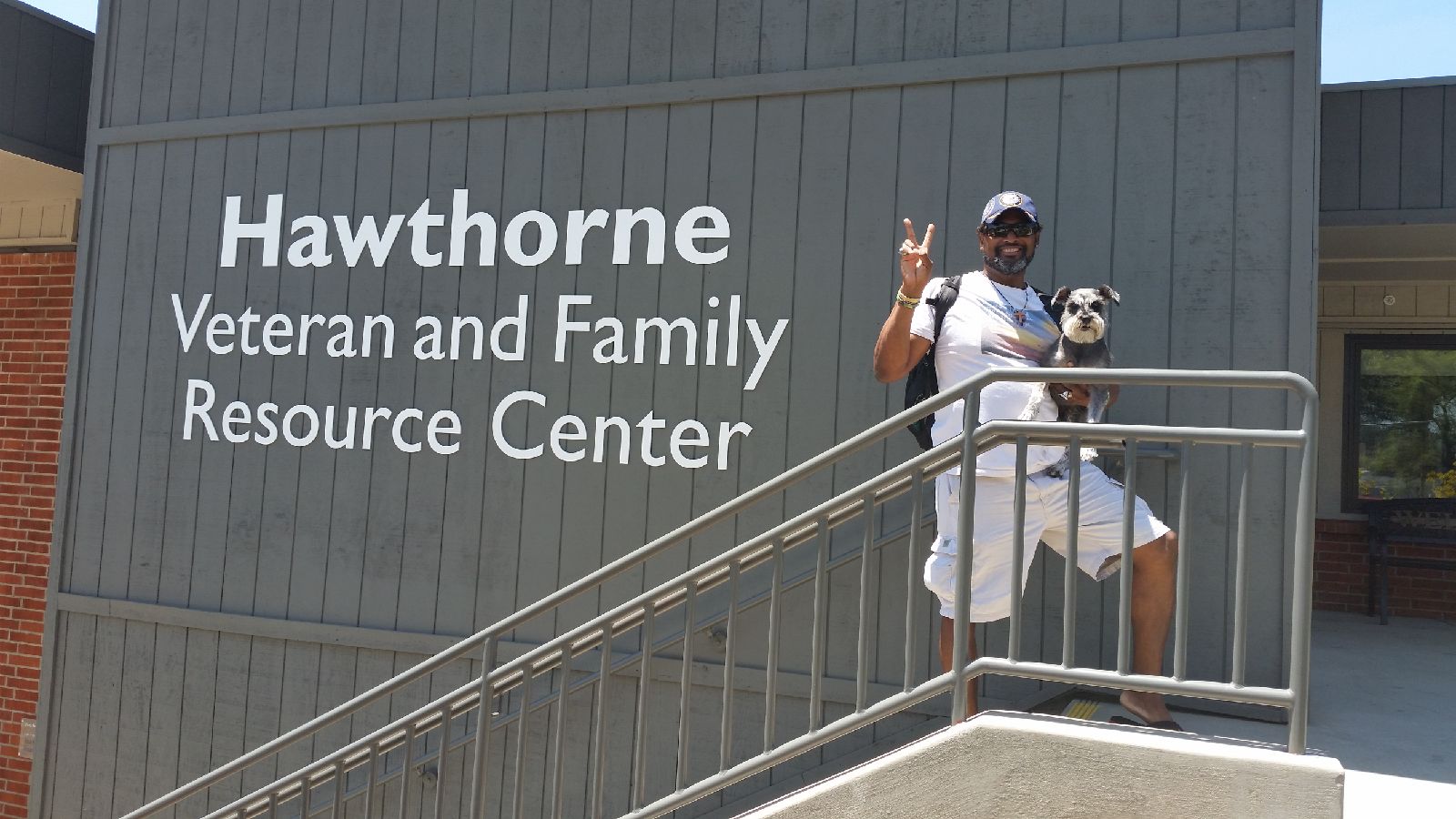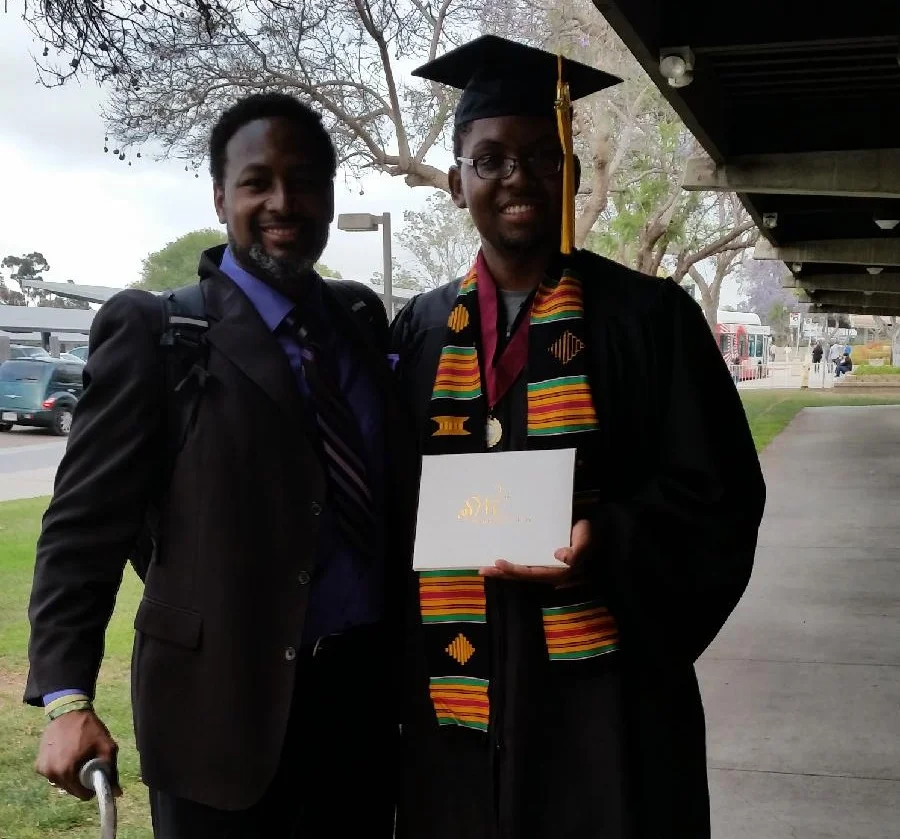On this episode of 'Homeless in San Diego: Real People, Real Stories,' host Greg Anglea, CEO of Interfaith Community Services, welcomes Michael Williams, a published author and formerly homeless Marine Corps veteran, back to the show.
Michael Williams was a recipient of housing services at the Veterans Shelter at Interfaith. He volunteered during the morning meal service which helped integrate him back into society and gave him a sense of purpose by giving back. These very experiences led him to publishing: “Inspirational Stories of the Homeless: Dignity, Nobility, and Decency.”
“As I was doing my volunteer work, I became emotionally and spiritually moved by the acts of the dignity and nobility and kindness that I was seeing within the homeless population that would move and inspire me every morning. The book was a catharsis of all of this intensity of spirituality that I saw in the homeless community, and it’s something I felt is really not talked about,” said Michael.
The book is an accumulation of 10 stories that impressed him the most. One story Michael shared began at the shelter after breakfast was prepared by volunteers. He said they serve around 150 meals daily and people experiencing homelessness can take a sack lunch with them as they leave the shelter.
The program aims to guarantee two meals a day, but on some days, they run out of lunches. He felt touched by a woman who selflessly gave up her lunch for a 10 year old girl to eat later that day because they had ran out before the child was able to get one.
Michael also expressed the spirituality he experienced from homelessness - it deepened his awareness toward the human condition. Beyond mental illness and drug addiction, there are many other reasons people become homeless.
They discussed Michael’s life before he was forced to live on the streets. He was a successful man who not only was a consultant in the performing arts industry, but also an economics major, insurance salesman, and he served his country as a Marine Corp Infantry Officer.
What lead him to living on the streets was his denial of the chronic and severe pain he suffered. Michael was unable to receive treatment for it, and shared that applying for disability pay required a complicated journey that overwhelms many. Michael had to sell his home, goods, and eventually his car to get by until he was able to receive help at Interfaith.
He expressed his gratitude toward the donors who made it possible for him to regain his self-sufficiency and who gave back to the community. He is now able to live independently people who care.
Michael is especially grateful for peoples' help because of the homeless children that are out there that no one talks about. He made a point that there is no certain profile that characterizes how someone ends up homeless compared to another person. There are college students as well as children living on the streets. They are trying to get by, going to school every day, and seemingly leading normal lives. Sometimes, we can never tell who is suffering immensely.
Another spiritual aspect of the show was brought up: the flaw in all of us - judging others too quickly. “We don't know what someone is going through or what leads them to be cranky that day or why they’ve turn to drugs or alcohol to soothe their pain. We don’t know. And so I really encourage our listeners to read some of the stories we share here,” said CEO Greg Anglea.
Michael has been rehabilitated for several years and shared that coming out of homelessness is not an immediate action. He said that acquiring a home, wardrobe, and furniture will take time. He also talked about the reintegration processes involved in rehabilitation such as finding a church, hair stylist, and grocery store. He said it’s all a part of starting over, but he is content knowing he is a thriving member of his community again.
The first step of becoming rehabilitated was being able to rent an apartment.
“It was one of the happiest days of my life. I was elated when I got approved for that apartment, and it made a difference. I could not wait to move in. I remember going in. He handed me my keys and I looked around my apartment. It was my place and after having been homeless for so long, the feelings are really interesting,” said Michael.
He arrived to his apartment with nothing but the clothes on his back and a duffel bag full of his stuff. He slept on the floor a couple of days, but felt grateful to be indoors. During his adjustment period, he realized there are so many things taken for granted when it comes to living in a home - simple things like our wardrobe, dishes, and a couch in the living room.
It took Michael two years to go from an empty apartment to making a house a home. He said rebuilding is a process that requires taking one thing at a time, especially where mental and emotional recovery is concerned.
“So the journey of ending homelessness is not ended, it is still a continuous journey that takes years in order for people to get to a point where they can reenter what I would call typical middle class America which I was a part of prior to my illness,” said Michael.
CEO Greg Anglea and Michael Williams discussed how mental health issues are often not the reason someone ends up living on the street, contrary to popular belief. Michael's goal is to break apart shallow perceptions and inspire empathy and compassion toward those suffering from hardship.
“Very often, many people think that people experiencing homelessness are suffering from mental illness and it is not a contributing factor to their homelessness. They made good, solid, mature decisions, however, they were overwhelmed and they did not have resources to meet the challenge,” said Michael.
Michael shared that enduring homelessness caused a tremendous amount of stress, anxiety, and depression which is a condition he suffered from after he found himself in the reality of homelessness. Rehabilitation from those experiences may require a period of recovery time based on the traumatic events he encountered from losing his job, home, car, and livelihood.
“If there is a good side to it, from a spiritual basis, it’s made me a kinder, more empathetic, more understanding human being, and less judgmental. Being less judgmental is a true gift of humanity,” said Williams.
He is currently working on his 5th and 6th book to contribute to sharing how people go on journeys they never expected to have. His philosophy is: the more empathy we can have for others, the more human we can be.
When people contribute volunteer effort or make donations toward these programs, we are saying yes to children eating, veterans being rehabilitated, and deepening out humanity. Whether it’s yes to a bagged lunch or yes to resources that provide the ability to reach self-sufficiency, Interfaith aims to lend a hand up for all of those in need.
Calls to Action:
Four copies of Mr. William’s book left to give away! For a chance to win, submit your feedback about the show, or suggest a topic for an upcoming episode at: www.homelessinsandiego.org/get-in-touch
You can buy the book on Amazon.com - be sure to use AmazonSmile and select a nonprofit for Amazon to donate to (no cost to you!)
Contribute to whichever organization you are most drawn to by volunteering or donating to help people who need help.
Be empathetic and understanding toward people who are experiencing homelessness.
Look people in the eye to create a moment of connection that respects someone experiencing homelessness as another human being.











